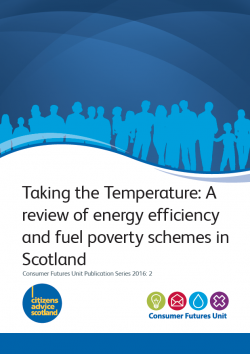
The Scottish Government have announced that they will introduce Scotland’s Energy Efficiency Programme (SEEP) in the coming years. This scheme will make use of the new powers over energy efficiency funds. Given the current political interest and potential levels of investment, CAS believes that it is important to ensure that the impacts resulting from undertaking large-scale energy efficiency installations are fully understood.
As the advocate for Scottish energy consumers, the Consumer Futures Unit (CFU) commissioned independent research to review the government and energy supplier funded energy efficiency and fuel poverty schemes that have been, and are being, delivered within Scotland. The research was commissioned to enable us to further understand the full range of impacts that past and current energy efficiency and fuel poverty activity has had on Scottish consumers. By filling this gap we believe that important lessons can be learned that can help refine current and inform the design of future schemes.
The resulting report is comprised of three parts and is intended to serve as a reference document for analysing previous schemes, to support the design of future programmes:
• A literature review examines existing evidence on the impacts expected to result from undertaking large scale energy efficiency interventions;
• The report then catalogues and reviews past and current energy efficiency and fuel poverty schemes in Scotland;
• Where possible, geographic maps highlight the reach of measures delivered through schemes across Scottish datazones.
The cataloguing of schemes provides insight into the benefits and limitations of each scheme’s design from the Home Energy Insulation Scheme (HIS) through to the most recent Energy Company Obligation (ECO2). This provides a comprehensive resource for reviewing and comparing scheme design and also flags up the importance of formally monitoring and evaluating schemes to ensure that such evidence can be compiled and utilised for future scheme design.
The CFU hope that the recommendations will provide the basis for further discussion on the appropriate design of future energy efficiency and fuel poverty schemes.